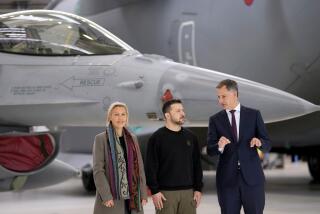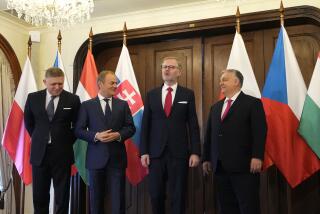Debate Stalls Purchase of Fighter Jets
- Share via
PRAGUE, Czech Republic — As the Czech government struggles over whether to buy about $2 billion worth of new fighter jets, Viktoria Hradska, who represents local manufacturers of ground weaponry, is among the proposal’s skeptics.
The Czech Republic is too small to make buying expensive jet fighters a priority, she said. “When such a supersonic airplane starts off from our country, it doesn’t even have time to turn around” before crossing the border, she said with a laugh and only a bit of exaggeration--the republic is about 300 miles across at its widest point.
“The country doesn’t have the money for a commitment of this magnitude,” added Hradska, chairman of the board of the RDP Group, an association of non-aerospace defense firms.
For half a decade, the quest for new jet fighters to supplement or replace aging Russian-built MIGs has been a key issue in the Czech Republic, Poland and Hungary, three relatively prosperous former Soviet Bloc nations that joined the North Atlantic Treaty Organization in 1999.
Advocates of such modernization argue that it is necessary to fulfill NATO commitments to defend one’s own airspace. Critics say that far more important are other NATO pledges, such as increasing the mobility, professionalism and communications capabilities of members’ armed forces.
Many international competitors in the dogfight for sales, which could be worth $6 billion or more among the three countries, had expected the contest to be settled by now. But it is dragging on, and some of the initial enthusiasm among the new NATO members for modernizing their air forces is waning.
The Czech and Polish governments desire modern jets for reasons of both patriotic pride and national security. But pressed by competing military needs and by arguments that money would be better spent on education and social services, both countries repeatedly have kicked the decision down the road.
Hungary finessed the issue in September by announcing that, rather than buy jet fighters any time soon, it will lease 14 JAS 39 Gripen fighter jets. The aircraft are made by a consortium of Britain’s BAE Systems and Sweden’s Saab.
But with negotiations on details continuing, the deal is not yet a sure thing. “Everything indicates that by the end of November we should come to an agreement,” Hungarian Prime Minister Viktor Orban said recently. Should the two sides fail to agree, Hungary might still acquire U.S. jets.
Czech Prime Minister Milos Zeman announced last week that his government would postpone until Nov. 30 a decision on whether to buy at least 24 Gripen jets.
The postponement leaves open the possibility that a tender issued by the Czech government this spring for the purchase of 24 to 36 fighter jets--in which the British-Swedish consortium is the only bidder--may be canceled.
That would reopen the option of the Czech Republic buying or leasing U.S. jets, either Lockheed Martin’s F-16 Fighting Falcon or Boeing’s F/A-18 Super Hornet.
The U.S. government would play a key role in any lease or sale of jet fighters. Washington did not submit any formal bids on behalf of American concerns during the initial tender.
One scenario much discussed in the Czech media is the possible lease or sale of decade-old but little-used F-16s that were originally produced for sale to Pakistan. The planes were never shipped due to a 1990 U.S. arms embargo imposed because of the South Asian nation’s efforts to develop nuclear weapons.
Those F-16s, which belong to the U.S. government, are mothballed at an Air Force base in the Arizona desert. The Czech government could purchase them for much less than the cost of the more up-to-date Gripens, although the expense of upgrading some equipment would cut into the savings.
Another scenario raised is a possible deal for U.S. jets that would involve American help in finding customers for the Czech-produced L-159, a subsonic trainer jet.
Zeman has said he may discuss the possible acquisition of American fighters during his current visit to the U.S. He met with President Bush on Friday, but the White House released no details of the meeting.
As for Poland, the government wants to acquire 16 fighter jets by 2003 and 44 more by 2006. This proposal has provoked fierce competition between France’s Dassault Aviation, which manufactures the Mirage 2000-5, and the makers of the Gripen and the F-16. But Poland also has repeatedly delayed a purchasing decision.
The Democratic Left Alliance recently took power from a center-right coalition, further disrupting efforts to make a quick decision about fighter jets. The previous government, which was led by former activists of the anti-communist Solidarity trade union, had hoped to make a choice in August.
The Democratic Left Alliance, led by former communists turned social democrats, is committed to a strong role in NATO but faces severe budget constraints.
In the Czech Republic, Zeman’s announcement of a delay in the decision on whether to buy Gripen fighters may reflect that it is “dawning on people” that the purchase of a fleet of fighter jets “is quite an expensive proposition,” said a Western expert familiar with the issue, who spoke on condition that he not be identified.
“There’s no shortage of fighter aircraft in the NATO arsenal,” the expert added. “If push comes to shove, 24 or 36 Czech fighters aren’t going to contribute that much.”
Among Czech politicians, there is no consensus on whether now is the right time to acquire fighter jets, whether it would be better to lease or buy if they are to be obtained, and which jet would be the best choice.
“Naturally we should have them, because according to [NATO agreements] we are to defend our airspace,” said Milos Titz, a member of the ruling Social Democratic Party and deputy chairman of the Defense and Security Committee in the lower house of Parliament.
Titz said he favors buying the Gripen, partly because the BAE-Saab consortium has offered significant offset investments and cooperation agreements for the Czech defense industry.
But Petr Necas, chairman of the Defense and Security Committee and a member of the opposition Civic Democratic Party, said his party believes it would be better “to postpone all decisions and wait three to five years, and then start a new tender.”
“I’m absolutely sure the main priority for our armed forces must be human potential, training, motivation, education, social security, health security, housing,” Necas said. “It’s necessary for us to go through a real deep military reform that would lead toward fully professional armed forces. It’s not possible at the same time to start a very expensive program like the purchase of supersonic fighters.”
More to Read
Sign up for Essential California
The most important California stories and recommendations in your inbox every morning.
You may occasionally receive promotional content from the Los Angeles Times.










